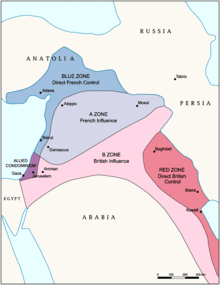
Back الاتفاقية البريطانية العراقية 1922 Arabic ההסכם האנגלו-עיראקי (1922) HE Trattato anglo-iracheno del 1922 Italian Tratado Anglo-Iraquiano Portuguese 1922 İngiliz-Irak Antlaşması Turkish
| Anglo-Iraq Treaty of 1922 | |
|---|---|
 The Anglo Iraq Treaty of 1922, Cmd 2370[1] | |
| Created | 1922 |
| Ratified | 1924 |
| Signatories | Percy Cox and Abd Al-Rahman Al-Gillani |
| Purpose | Codification of the British Administration of the newly created Kingdom of Iraq |
The Anglo-Iraqi Treaty of October 1922 was an agreement signed between the British and Iraqi governments. The treaty was designed to allow for Iraqi self-government while giving the British control of Iraq's foreign policy. It was intended to conclude an agreement made at the Cairo Conference of 1921 to establish a Hashemite Kingdom in Iraq.
In the aftermath of the First World War, the former possessions of the Ottoman Empire were divided between France and Britain, with the remainder becoming the present-day country of Turkey. The former Ottoman provinces of Baghdad, Mosul, and Basra were proposed to become a League of Nations Class A mandate under direct British rule, known as the British Mandate for Mesopotamia. The general public in the region reacted negatively to the mandate, resenting the imposition of British control; this led to the Iraqi revolt of 1920, which caused the British to instead decide that the mandate territories would instead become the Kingdom of Iraq. On 23 August 1921, Faisal ibn Hasayn was crowned as Faisal I, King of Iraq.
Concurrently, the area acquired by the new kingdom was going through a period of political turmoil. Nationalists who believed that the expulsion of the Ottomans would lead to greater independence were disappointed at the system of government decided for the British Mandate of Mesopotamia. Rather than the people of the region gaining a new sense of national identity through self-government, the British imported civil servants from India who had previous knowledge and experience of how to manage the administration of an overseas possession.
The Anglo-Iraqi Treaty of 1922 served to prevent uprisings in the intended new Kingdom of Iraq by giving Britain direct control of the kingdom's military, and significant influence over its economic and political affairs.

- ^ "The Anglo Iraq Treaty of 1922" (PDF). Archived from the original (PDF) on 2016-03-03. Retrieved 2019-05-21.
- ^ Coughlan, Robert (27 November 1950). "Mystery Billionaire". Life. Vol. 29, no. 22. pp. 81–107. ISSN 0024-3019.